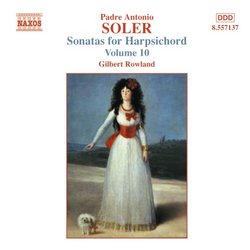| All Artists: Antonio Soler, Gilbert Rowland Title: Soler: Sonatas for Harpsichord, Vol. 10 Members Wishing: 1 Total Copies: 0 Label: Naxos Original Release Date: 1/1/2000 Re-Release Date: 1/20/2004 Genre: Classical Styles: Chamber Music, Forms & Genres, Sonatas, Historical Periods, Classical (c.1770-1830) Number of Discs: 1 SwapaCD Credits: 1 UPC: 747313213726 |
Search - Antonio Soler, Gilbert Rowland :: Soler: Sonatas for Harpsichord, Vol. 10
 | Antonio Soler, Gilbert Rowland Soler: Sonatas for Harpsichord, Vol. 10 Genre: Classical
|
Larger Image |
CD Details |
CD ReviewsIf You Love Scarlatti, You'll Love Soler, and This CD. J Scott Morrison | Middlebury VT, USA | 01/29/2004 (5 out of 5 stars) "I'm a Scarlatti nut, and have reviewed a number of Scarlatti sonata CDs here at Amazon; Soler was, of course, a student of Scarlatti's and his sonatas have superficial resemblance to those of Scarlatti. But the more you listen the more you realize how different they truly are. Soler uses less counterpoint as he tiptoes into the increasingly homophonic galant style. His harmonic language is much more daring than Scarlatti's; he often modulates wildly. Still many of Scarlatti's trademarks are present--cross-hand technique, driving dance rhythms, bipartite sonata form. I've also reviewed several Soler discs, although none from this series on Naxos featuring British harpsichordist Gilbert Rowland (and, no, he's not the old movie star of the same name spelt slightly differently). Most recently I've reviewed Soler sonatas played on modern pianos by Marie-Luise Hinrichs and Ysidro Barrio. Earlier I raved about harpsichordist Scott Ross's Soler disc which, unfortunately, was the only one he did before his untimely death; thank goodness he had already concluded his complete traversal of Scarlatti's 555 sonatas. This disc is the tenth and newest of Rowland's complete set; I reckon he'll be finished by about Volume 15 or so. Those of you who know Rowland's work will have no particular surprises here. His playing is both clean and spirited, brilliant but expressive. His ornaments are tasteful but occasionally pleasantly surprising. He is one of those harpsichordists who does not specialize in the Germans. Rather he primarily plays Spanish (naturally) and French music; he has also recorded a fair amount of Rameau. One of the things I like about Rowland's playing is the way he characterizes each sonata differently. Of course, Soler's style does vary from piece to piece, but some players, like the otherwise redoubtable Maggie Cole, don't seem to notice this and they just keep plugging away in the same way. On this disc I was particularly struck by the three late multi-movement sonatas-- multi-movements being one way, among many, that Soler's music is different from Scarlatti's. No. 64 in G major starts with a Pastorale that incorporates Spanish dance rhythms with some charmingly wacky harmonic twists. Its Allegretto gracioso is in proto-sonata form in which dotted rhythms abound; most striking is the really quite startling chromaticism. The third movement, 'Intento a 4,' is a lively double fugue, and is one of the most masterfully contrapuntal things Soler ever wrote. ('Intento' is a term some Spanish composers used to indicate a fugue.) It, too, wanders through distant keys and then in the final moments Soler introduces some charming bell-like effects. The two-movement Sonata No. 126 in C minor begins with a slowish movement that acts as if a fugue is about to follow, but then veers into a kind of fantasia of arpeggios and dotted-note figures. This long movement--over seven minutes--then becomes a kind of potpourri with new melodies following one after the other in profusion. It is held together by quasi-ritornello of the dotted figure. The second movement Allegro is a flat-out minor-key gigue in two parts that modulates all over the place, eventually ending in the relative major. I think of all the movements on this disc this is my favorite. It is joyfully infectious. (And it must be great fun to play.) Sonata 61 in C major has a first movement Rondo which sounds almost French to me. The second movement is almost orchestral in its use of full-handed chords and left-hand octaves. It also has some strumming guitar effects. III is a kind of 'revolving minuet' (according to the fine notes by harpsichordist Rowland) in which themes are all repeated but in a different order than they first appeared. The virtuosic final movement Allegro is headlong and utilizes much hand crossing, along with lots of Scotch snaps. It makes an exciting finish to the disc. I was familiar with Rowland's Rameau but this is the only issue from this series that I've acquired. It seems to me as good a place as any to start if you're interested in Rowland's way with Soler.Recommended.TT=73:51Scott Morrison"
|

 Track Listings (14) - Disc #1
Track Listings (14) - Disc #1